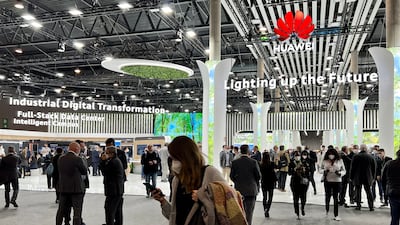China's Huawei Technologies will continue to use its own operating system amid its inability to access Google's services and will use it to pursue an aggressive expansion strategy.
The Shenzhen-based company introduced a vast line-up of products and services at the Mobile World Congress (MWC) in Barcelona, and pledged to press ahead with a new five-year globalisation strategy.
"Huawei will continue its globalisation strategy, in standards, talent, supply chain and more," Guo Ping, Huawei's rotating chairman, said in an online keynote at the MWC. "Huawei is committed to helping customers who choose it to achieve the greatest business success.”
He maintains that Huawei won't back away from expanding in international markets and will be more than willing to support customers who choose to work with them.
Huawei has been caught in the crossfire of a trade and economic discord between the US and China, after the administration of former president Donald Trump imposed sanctions on the company.
The company's annual revenue fell by nearly a third from the previous year, Huawei said last December.
"We will continue our innovation. This is a very tough time — a difficult time for Huawei — but we will never give up. Together we will survive the hard winter; I am looking forward to embracing the warm spring with you," Richard Yu, the chief executive of Huawei's Consumer Business Group, said in his keynote at the MWC.
Mr Yu rolled out new product lines at the MWC, including new MateBook laptops, MatePad tablets — with one using electronic ink – the PixLab X1 printer and Sound Joy wireless speaker.
Separately, Huawei also introduced new products and solutions for industries, centred around digital transformation and sustainability. It also revealed new solutions for full-stack data centres and intelligent campuses at a summit.
One of the biggest challenges Huawei is trying to cope with is its inability to access services from US internet titan Google, which owns the Android operating system that powers about 70 per cent of smartphones worldwide as of February, according to StatCounter.
After the former Trump administration placed Huawei on its so-called entity list in 2020 that blacklisted it from doing business with their American counterparts, the company developed its own operating system, HarmonyOS, to run its devices.
"I don't know and I don't think so [Huawei will return to Android]. We put all our effort in HarmonyOS, and we do not act as if it will switch back," Mohamed Madkour, Huawei's vice president of global carrier networks solutions and marketing, told The National.
"We don't expect this will be solved tomorrow or next month. We act as if this will stay forever."
HarmonyOS, which was first used in TVs made by Huawei's former subsidiary Honor in 2019, has expanded throughout Huawei's ecosystem. Today, it runs on more than 320 million devices, has more than 5.1 million developers and around 170,00 apps, according to Huawei.
"We do not see a change in the global geopolitical situation, no matter if it's President Trump or President [Joe] Biden. For us, it does not matter; we are still under the sanctions of the entity list and we comply with this regulation," Mr Madkour said.
"But if you ask me what has changed since this thing happened, it's the innovation, our new strategy, new approach to diversifying business, new way of tackling things and investing more. That's the effect; other stuff are still the same."
At MWC, Huawei scored two major agreements with the UAE's two telecommunications companies. It signed an agreement with Etisalat UAE — a unit of the newly-rebranded e& conglomerate — to deploy the first 5G Edge box in the Middle East.
Earlier, it signed a preliminary agreement with Emirates Integrated Telecommunications Company, the Dubai operator known as du, to develop multi-access edge computing that will help the latter diversify its communications services.


